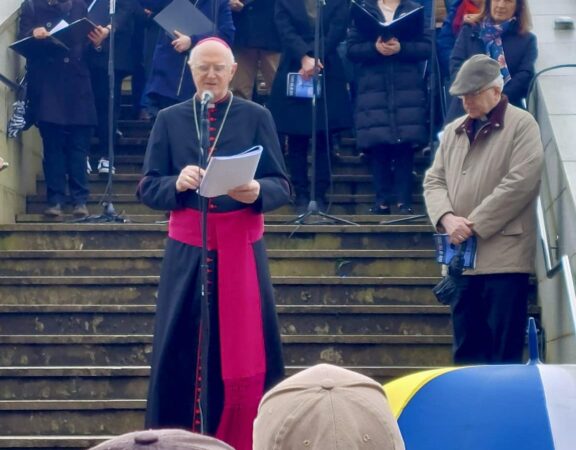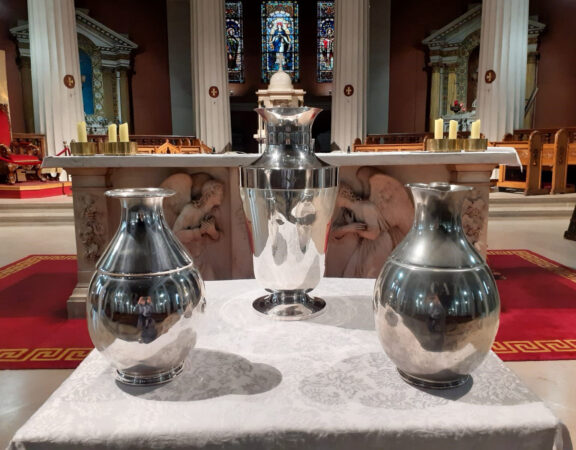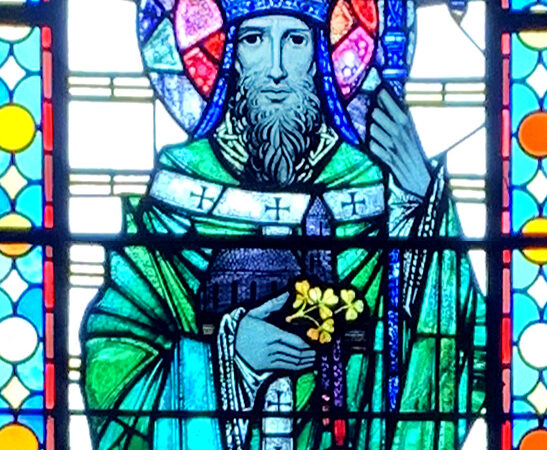Corpus Christi 2015
Mass for the 175th Anniversary of “The Tablet”
Homily notes of Most Rev. Diarmuid Martin Archbishop of Dublin
Saint Mary’s Pro-Cathedral, 7th June 2015
Introduction
“We celebrate today the Feast of Corpus Christi, the Feast of the Most Holy Body and Blood of Christ. The Eucharist carries within it a synthesis of the entire life of Jesus Christ, a life offered in sacrifice and given for others. The God revealed in Jesus Christ is not an isolated, closed God, but a God who reaches out and communicates in love. As Christians we are men and women called to communicate the love Jesus in word and through the way we live.
At our Mass this morning we remember the 175th anniversary of the Catholic weekly The Tablet, which saw the light of day for the first time here in Dublin. I welcome the many friends of The Tablet who have come from far and wide to join us for this Mass.
Homily
We celebrate the Feast of Corpus Christi, the feast of the Eucharist. Through our sharing in the body and blood of Christ we become the Mystical Body of Christ. Through our communion with the mystery of Christ’s death and resurrection we enter into communion with Christ and with each other and form God’s people.
The Feast of Corpus Christi is a feast on which we reflect on the bond between the Eucharist and life. Corpus Christi processions, which have long been a part of Catholic popular devotion, bring the Eucharist along the streets of our cities and villages to remind us that Eucharist and life belong together. The Feast of Corpus Christi reminds us that the self-giving love of Jesus which we celebrate in the Eucharist must become the driving force of our lives in our homes, in our families, in the way we relate with others, in the vision of future society we wish to attain.
Eucharist is at the heart of being a Christian. It is the Eucharist which constructs the Church. The Church is a gift given to us, not something of our own construction. The Church is the fruit of the gratuitous love of God which becomes visible in Jesus Christ, who loved us first and who died for us and rose again so that we can have life.
We celebrate the Eucharist “in memory of me”. Our lives, our entire Christian existence assume their deepest expression when they too become the celebration of the “memory of Jesus Christ”. Being a Christian means living out in our daily lives that memory of Jesus which is made present in the Eucharist. It means being attentive in all we do, to what he did and to what he said and to how he revealed to us who God is.
Being a Christian means translating “the memory of Jesus” into the concrete actions of our lives. We must allow the saving, gratuitous, self-giving love of Jesus work through us. This means also that we cannot return to daily life from the Eucharist without being changed. Those who belong to the Eucharistic community must be in the forefront of all those factors which forge community and unity. They must be courageous in rejecting the factors which lead to breakdown in community. Because of sin, our capacity for dialogue and the formation of community has been dimmed, and we live in a world marked so often by the bitter experience of incomprehension and separation and all that that brings with it.
Through his rising from the dead, however, Jesus has broken down that power of sin and restored our ability to communicate and to enter into communion with each other. Jesus is the risen one and if we believe in the resurrection then our own language must always be language of resurrection. Language of resurrection is language of hope and liberation, rather than judgement and darkness, language of understanding and mutual respect and forgiveness and not incomprehension.
The history of salvation is a history of the communication of God with man. In being created in the image and likeness of God we are enabled to embrace divine revelation and to enter into loving dialogue with Him. The communication between God and humanity reached its perfection in Jesus Christ, the Word made flesh.
Communication therefore belongs to the very essence of the Church. Christians are people with a message. We are not, however, people with an ideology. Faith is not about the repetition of formulae. It is about our relationship with a person whose life is the source of our message and about journeying through life ever seeking to find the language and the wisdom which will enable us to understand more deeply the action of God’s love within us.
Communication is also important within the Church. There is a relationship between the way in which the Church communicates the message of Jesus and how that message is lived and communicated within the Church. We encounter the message of Jesus in the framework of human language. There is the language of human expression and there is also the language of human perception and the reception of message.
For 175 years The Tablet has been a distinctive model of building up communication within the Church and of a dialogue between the realities of the Church and the culture in which we live. The Tablet has an enviable history of providing news and information about the Church around the world. I have always been one of those who opens The Tablet from the back pages to read first about the Church in the world. In more recent times I have begun to do so with a little more apprehension than in the past, in the fear of finding some critical references to myself. But criticism can be a vital form of communication and service of the truth!
The contribution of The Tablet concerns also another form of communication which is vital within the Church: fostering criteria of discernment about what one might call “the state of health” of the Church. Pope Pius XII in a speech to Catholic journalists way back in 1950 spoke of public opinion within the Church. Public opinion is certainly about formation and integration of the message, but it also about diversity and dialogue. For Pope Pius: “[the Church] too is a living body and there would be something missing from her life if there were no public opinion within her, a defect for which pastors as well as faithful would be responsible”.
The concept of public opinion in the Church challenges us to reflect on the language we use to present the integral message of Jesus and what vision of the Church our language represents. Our message always remains that of the integral deposit of the faith. The Church’s essential teaching remains.
Public opinion in the Church cannot however be one of mere conformity. Pope John Paul II has spoken about: “presenting the content of faith in the most varied ways imaginable; and offering to all who search the possibility of entering into dialogue with the mystery of God…”
Public opinion in the Church can neither be built on the language of divisiveness. It must use the language of dialogue, of sensitivity and of openness. It must be the language of seeking to understand and to enter more deeply into the mystery of faith. It may at times be a tentative, enquiring and questioning language and not a language of false certitude. I think of the warning of Pope Francis at the conclusion of the Synod of Bishops last year when he spoke of: “[an inflexibility] within the certitude of what we know and not of what we still need to learn and to achieve, of not allowing oneself to be surprised by God, by the God of surprises”.
Public opinion within the Church has nothing to do with the dogmatism of the right or of the left; it has nothing to do with the superficiality, shallow and cynical scraping-up of destructive negativity of tabloidism. It must never build up a language of fear but a language of the hope and gentleness that must always accompany faith in Jesus Christ.
The Tablet has over these past 175 years attempted to be such an instrument of public opinion in the Church. Sometimes it has gotten it right; sometimes it has gotten it wrong. In all it has attempted to foster a sense of adult faith. We are proud that it saw the light of day for the first time here in Dublin.
Jesus was the great communicator. He expressed himself in the variety of ways – of media – that were open to him at this time: he spoke parables; he spoke in Synagogues and along the streets; he spoke on the shores of the lake and on the mountaintops; he spoke to the learned and he ate with sinners.
When he journeys with the disciples along the road to Emmaus who are full of doubts and sadness about what had happened in Jerusalem and feeling that their hopes had been in vain, Jesus does not confront them directly with his identity; he takes time to explain patiently the scriptures to them, provoking within their hearts a deeper appreciation of what the scriptures had been saying to them all along. Slowly their hearts begin to burn.
The final understanding comes with the breaking of bread, that power of the Eucharist to lead us into the depths of the identity of Jesus and of the light and hope and sense of communion that the Eucharist brings then and in our days. ENDS









